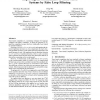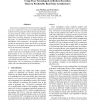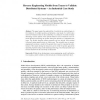1914 search results - page 2 / 383 » Using Execution Trace Data to Improve Distributed Systems |
134
Voted
ASPLOS
2011
ACM
14 years 6 months ago
2011
ACM
Trace-based compilation is a promising technique for language compilers and binary translators. It offers the potential to expand the compilation scopes that have traditionally be...
138
Voted
RTAS
2008
IEEE
15 years 9 months ago
2008
IEEE
Instruction scratchpads have been previously suggested as a way to reduce the worst case execution time (WCET) of hard real-time programs without introducing the analysis issues p...
130
Voted
CBSE
2010
Springer
15 years 7 months ago
2010
Springer
Abstract. Software systems should evolve in order to respond to changing client requirements and their evolving environments. But unfortunately, the evolution of legacy application...
108
click to vote
PLDI
2005
ACM
15 years 8 months ago
2005
ACM
Faults that occur in production systems are the most important faults to fix, but most production systems lack the debugging facilities present in development environments. TraceB...
137
Voted
ECMDAFA
2007
Springer
15 years 9 months ago
2007
Springer
The paper targets the applicability of model-driven methodologies to the validation of complex systems and presents a case study of a mobile radio network. Validation relies on the...



